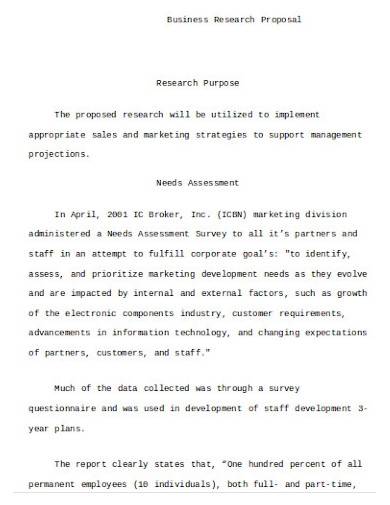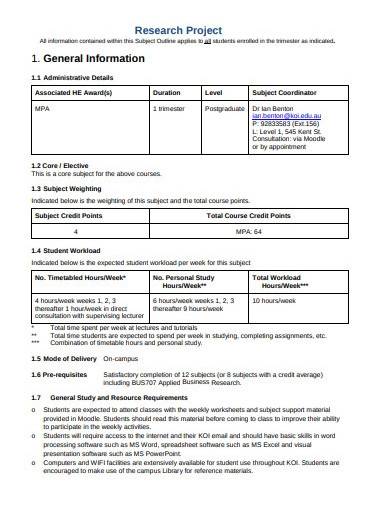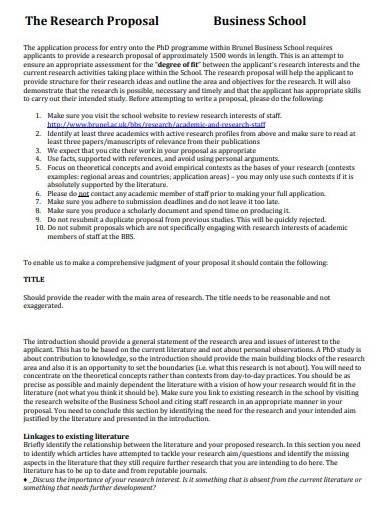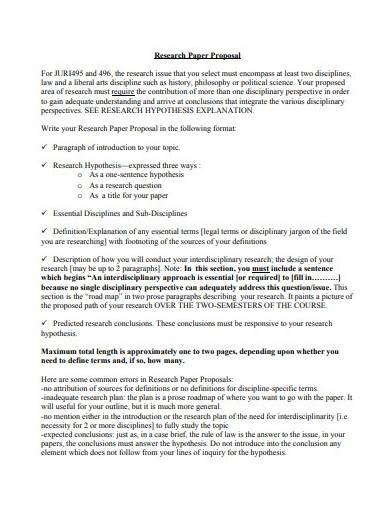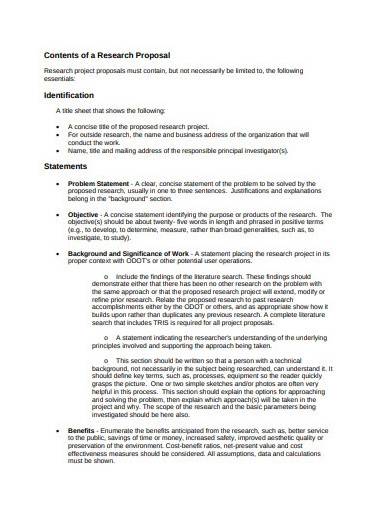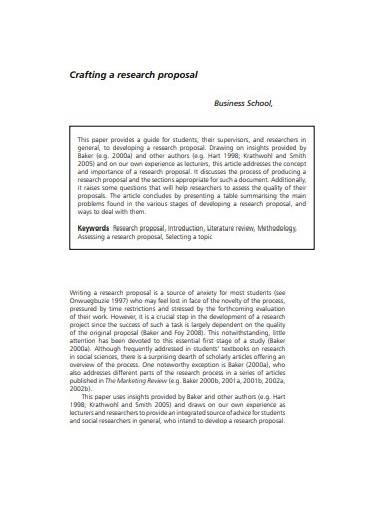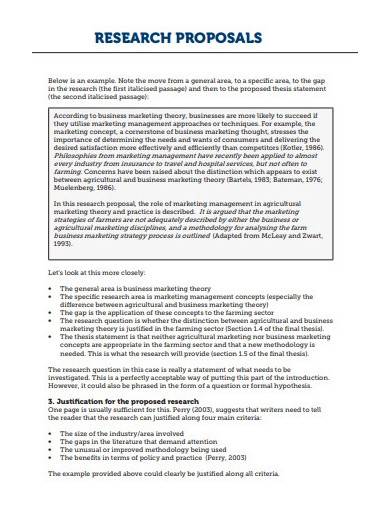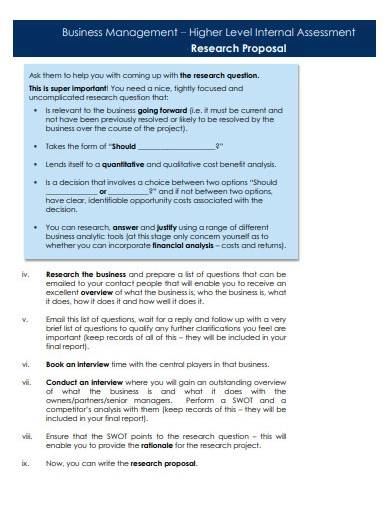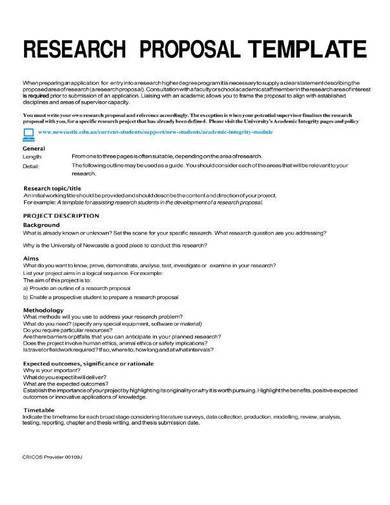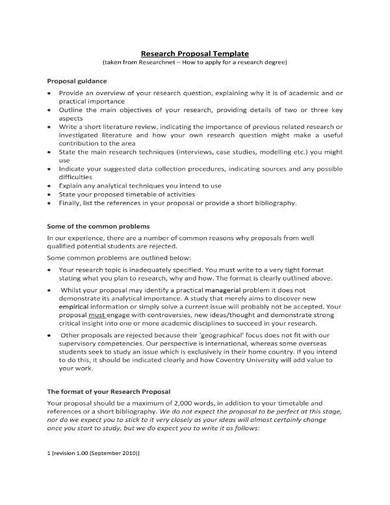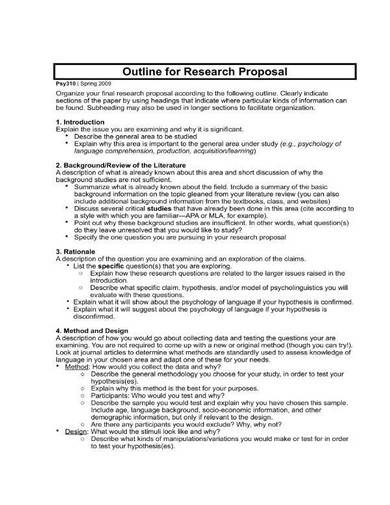A business or organization with proper research has an excellent chance of winning the market. Research is a strategy that helps businesses discover new ideas and factors that will help them in improving business operations, generating concrete action plans, securing a healthy financial status, and more. Hence, it is essential to execute it well. Thus, the purpose of having a business research proposal. In this article, you will learn the importance of writing one. Scroll down below.
FREE 10+ Business Research Proposal Samples & Templates in PDF | MS Word
In this article, we have provided business research proposal samples and templates that are accessible anytime. These sample templates come with professionally written content and are preformatted in PDF and MS Word file formats for your convenience. Check them out now!
1. Business Research Proposal Sample PDF
2. Business Research Proposal
What are the Types of Business Research?
Business research is a systematic process of collecting, analyzing, interpreting, and presenting information related to a business problem or opportunity. There are several types of business research, each serving different purposes. Here are some common types:
1. Exploratory Research:
- Aimed at exploring a new area or gaining insights into a phenomenon.
- Helps in understanding the basic nature of a problem.
2. Descriptive Research:
- Focuses on providing an accurate description of a situation or phenomenon.
- Involves gathering data to characterize and define the subject of study.
3. Causal Research:
- Investigates cause-and-effect relationships between variables.
- Aims to establish a cause-and-effect connection between two or more variables.
4. Correlational Research:
- Examines the statistical association between two or more variables.
- Does not imply causation but identifies relationships between variables.
5. Cross-Sectional Research:
- Involves collecting data from participants at a single point in time.
- Provides a snapshot of the situation or phenomenon.
6. Longitudinal Research:
- Involves collecting data from the same group of participants over an extended period.
- Helps to track changes or developments over time.
7. Quantitative Research:
- Focuses on numerical data and statistical analysis.
- Involves the use of surveys, experiments, and structured observations.
8. Qualitative Research:
- Emphasizes understanding and interpreting non-numerical data.
- Involves methods such as interviews, focus groups, and case studies.
9. Action Research:
- Conducted by practitioners within an organization to solve specific problems.
- Involves a cyclical process of planning, acting, observing, and reflecting.
10. Case Study Research:
- In-depth analysis of a specific case or situation.
- Often used to gain a deep understanding of a particular phenomenon.
11. Cross-Functional Research:
- Involves collaboration between different functional areas of a business.
- Aims to address complex issues that require input from multiple perspectives.
12. Market Research:
- Focuses on understanding market trends, customer preferences, and competition.
- Helps businesses make informed decisions about their products or services.
13. Social Media Research:
- Involves analyzing data from social media platforms to understand consumer sentiment, trends, and feedback.
These types of business research can be used individually or in combination, depending on the nature of the research question and the goals of the study.
3. Business Research Proposal Example
4. Business Proposal Research
5. Business Research Proposal Sample
How to Make a Business Research Proposal
A business research proposal serves a vital role in research related to business. That is why it is only imperative to ensure that it follows the accurate procedure and should contain the relevant information. Using this allows you to outline the things to be done to gather the right data to be presented in a research report. So, if you are writing a research proposal for your business and you don’t know-how, then you are on the right page. Below are simple yet useful tips on how to make an informative and effective business research proposal. Read below.
1. Start with a Title and an Overview
Begin writing your business research proposal by providing the business research title and a brief yet informative research overview. The title should be concise and triggers the curiosity of the management. As for the research overview, it should present the highlight of the research.
2. Write a Clear Introduction
The next thing you need to put in your business research proposal is a precise and clear introduction. This section should identify what the research is all about, its scope, and its importance to the business. The introduction should also provide the objectives and sub-objectives of the business study that needs to be achieved.
3. Present the Data Gathering Procedure
After the introduction, the next thing you need to do is to present the data gathering procedure. In this section, you have to outline the activities that should be done for the process. And to this, you have to identify the appropriate data gathering methods, whether qualitative or quantitative research. There are different methods and strategies that you can use. However, you should have to choose the appropriate methodology that will work on your business process.
4. Provide and Organize the Research Questionnaire
The next thing you have to include in your business research proposal is the research questionnaire. The list of questions will help you collect relevant and useful data that will complete the research process. In presenting this information, you may use bullet points to make it organized and understandable.
5. State a Brief Conclusion
Finalize your business research proposal by writing a brief conclusion that summarizes the whole idea of your proposals’ content. In this section, you have to emphasize the importance and purpose of research for your business. Also, provide a statement of the several benefits and advantages that the company will gain from the research.
6. Make the Content Simple and Organized
Having an informative business research proposal is not useful if the people who will read it are not able to grasp the idea the proposal is providing. That is why it is essential to use only simple words and terms that are readable and understandable by your readers. The organization of thoughts is also important. It presents the right structure of information accordingly.
6. Research Proposal About Business
7. Business Administration Research Proposal PDF
Advantages and Disadvantages of Business Research?
| Advantages of Business Research | Disadvantages of Business Research |
|---|---|
| 1. Informed Decision-Making: Provides a basis for making informed and strategic business decisions. | 1. Cost: Conducting research can be expensive, especially for small businesses with limited resources. |
| 2. Market Understanding: Helps in understanding market trends, customer preferences, and competition. | 2. Time-Consuming: Research processes can be time-intensive, leading to delays in decision implementation. |
| 3. Risk Reduction: Enables businesses to identify and mitigate potential risks associated with new ventures or strategies. | 3. Complexity: The research process can be complex, requiring expertise and specialized skills. |
| 4. Innovation: Fosters innovation by identifying new opportunities and areas for improvement. | 4. Limited Accuracy: Findings may not always be completely accurate, and there could be uncertainties in data interpretation. |
| 5. Competitive Advantage: Provides a competitive edge by staying ahead of market changes and customer preferences. | 5. Bias and Subjectivity: Research outcomes may be influenced by researcher bias or subjective interpretations. |
| 6. Customer Satisfaction: Helps in understanding customer needs and improving products or services to enhance customer satisfaction. | 6. Ethical Concerns: Ethical issues such as invasion of privacy may arise during data collection. |
| 7. Resource Allocation: Aids in effective allocation of resources by identifying areas of high potential return on investment. | 7. Limited Generalization: Findings may not always be applicable universally due to specific contextual factors. |
| 8. Strategic Planning: Supports the development of long-term business strategies and goals. | 8. Changing Dynamics: Business environments are dynamic, and research findings may become outdated quickly. |
| 9. Measurement of Success: Provides a basis for measuring the success of implemented strategies or changes. | 9. Resistance to Change: Employees and stakeholders may resist changes based on research findings. |
| 10. Stakeholder Confidence: Builds confidence among stakeholders, investors, and customers through evidence-based decision-making. | 10. Data Collection Challenges: Obtaining accurate and relevant data can be challenging, especially in diverse markets. |
This table highlights some key aspects of both the advantages and disadvantages of business research. Keep in mind that the impact of these factors can vary depending on the specific context and industry.
8. Research Proposal on Business Management PDF
9. Business Research Examples PDF
10. Simple Research Proposal Template
11. Research Proposal Outline Sample
What is a Business Research Proposal?
Researches that are related to businesses are essential for sustainability and success. According to an article from Medium, research is a critical component for businesses, specifically market research. Hence, business owners should put enough effort into researching to secure a permanent and high spot in the market. And this is where a business research proposal comes useful—the first thing that management should have before research.
A business research proposal is a written document used by management for either marketing research, accounting research, etc. The business research proposal presents and justifies the purpose of the study to be conducted. This also outlines the ways on how business research should be conducted. The standard length for the business research proposal is two to three pages. Nonetheless, it should be informative and well-written.
FAQs
What are the types of Research Proposal?
There are two types of research proposals that are useful for businesses, organizations, as well as in academic, approval proposals and funding proposals. Approval proposals refer to a written document that is written before doing the actual research. On the other hand, a funding proposal refers to a written document that seeks research funds.
What should a Research Proposal include?
A research proposal must present the idea of what the research is about and its importance. Thus, it should include a clear research title, a research overview, an introduction, the questionnaire, data gathering methods, and a research timeline. These components are commonly used in business and academic research.
How do you start a Business Research Proposal?
Begin a business research proposal with a concise introduction outlining the research problem, its significance, and the proposed methodology. Clearly state the objectives and expected outcomes to provide a solid foundation for the study.
What is the role of Business Research?
Business research plays a crucial role in informing strategic decisions by gathering, analyzing, and interpreting relevant data. It guides organizations in understanding market trends, consumer behavior, and industry dynamics for informed decision-making and sustainable growth.
What is ethics in Business Research?
Ethics in business research involves adhering to principles of integrity, honesty, and fairness. It ensures researchers conduct studies responsibly, respect participants’ rights, and maintain confidentiality, fostering trust and credibility.
Business research is one of the most important components of a sustainable and successful business. With this, businesses or organizations will be able to grasp new ideas that they can use to enhance their operations and improve marketing strategies. Hence, making sure that business research follows the standard format and obtains the necessary information. Thus, the use of a business research proposal to make the process comprehensive and effective.
Related Posts
FREE 10+ Resource Tracking Samples & Templates in MS Word | PDF
FREE 4+ Clinical Case Study Samples & Templates in PDF
FREE 10+ Content Validity Samples & Templates in PDF
FREE 10+ Construct Validity Samples & Templates in MS Word | PDF
FREE 10+ Code of Human Research Ethics Samples & Templates in MS Word | PDF
FREE 10+ Biography Research Report Samples and Templates in PDF
FREE 10+ System Documentation Samples & Templates in MS Word | PDF
FREE 10+ Process Document Samples & Templates in MS Word | PDF
FREE 10+ Action Research Samples & Templates in PDF
FREE 10+ Longitudinal Research Samples & Templates in PDF | MS Word
FREE 10+ Causal Research Samples & Templates in MS Word | PDF
FREE 10+ Client Discovery Samples & Templates in MS Word | PDF
FREE 10+ Null Hypothesis Samples & Templates in MS Word | PDF
FREE 9+ Product Knowledge Samples & Templates in PDF
FREE 10+ Software Documentation Samples & Templates in MS Word | PDF

